
The Cross of Gold speech was delivered by William Jennings Bryan, a former United States Representative from Nebraska, at the Democratic National Convention in Chicago on July 9, 1896. In his address, Bryan supported "free silver", which he believed would bring the nation prosperity. He decried the gold standard, concluding the speech, "you shall not crucify mankind upon a cross of gold". Bryan's address helped catapult him to the Democratic Party's presidential nomination and is considered one of the greatest political speeches in American history.

Presidential elections were held in the United States on November 3, 1896. Former Governor William McKinley, the Republican nominee, defeated former Representative William Jennings Bryan, the Democratic nominee. The 1896 campaign, which took place during an economic depression known as the Panic of 1893, was a political realignment that ended the old Third Party System and began the Fourth Party System.
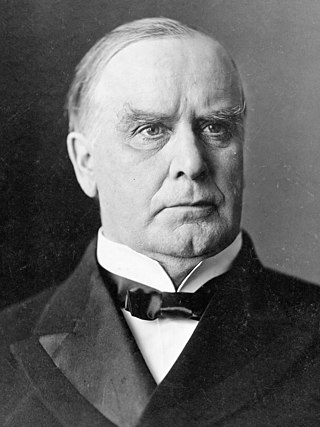
Presidential elections were held in the United States on November 6, 1900. Incumbent Republican President William McKinley defeated his Democratic challenger, William Jennings Bryan. McKinley's victory made him the eighth president to win consecutive re-election and first since Ulysses S. Grant accomplished the same feat in 1872. Until 1956, this would be the last time in which an incumbent Republican president would win re-election after serving a full term in office. This election saw the fifth rematch in presidential history but the first to produce the same winner both times; neither would occur again until 1956.

William Jennings Bryan was an American lawyer, orator, and politician. He was a dominant force in the Democratic Party, running three times as the party's nominee for President of the United States in the 1896, 1900, and 1908 elections. He served in the House of Representatives from 1891 to 1895 and as the Secretary of State under Woodrow Wilson from 1913 to 1915. Because of his faith in the wisdom of the common people, Bryan was often called "the Great Commoner", and because of his rhetorical power and early fame as the youngest presidential candidate, "the Boy Orator".

The People's Party, usually known as the Populist Party or simply the Populists, was an agrarian populist political party in the United States in the late 19th century. The Populist Party emerged in the early 1890s as an important force in the Southern and Western United States, but declined rapidly after the 1896 United States presidential election in which most of its natural constituency was absorbed by the Bryan wing of the Democratic Party. A rump faction of the party continued to operate into the first decade of the 20th century, but never matched the popularity of the party in the early 1890s.

Arthur Sewall was an American shipbuilder from Maine, best known as the Democratic nominee for Vice President of the United States in 1896, running mate to William Jennings Bryan. From 1888 to 1896, he served as a member of the Democratic National Committee and unsuccessfully ran for Maine's Senate seat against Eugene Hale. The only elective offices Sewall held were as councilman and alderman in the town of Bath, Maine.

Richard Parks Bland was an American politician, lawyer, and educator from Missouri. A Democrat, Bland served in the United States House of Representatives from 1873 to 1895 and from 1897 to 1899, representing at various times the Missouri 5th, 8th and 11th congressional districts. Nicknamed "Silver Dick" for his efforts to promote bimetallism, Bland is best known for the Bland–Allison Act.
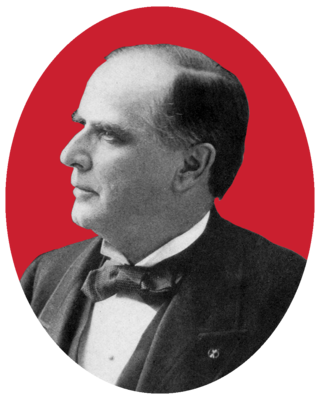
The 1896 Republican National Convention was held in a temporary structure south of the St. Louis City Hall in Saint Louis, Missouri, from June 16 to June 18, 1896.

Bourbon Democrat was a term used in the United States in the later 19th century and early 20th century (1872–1904) to refer to members of the Democratic Party who were ideologically aligned with fiscal conservatism or classical liberalism, especially those who supported presidential candidates Charles O'Conor in 1872, Samuel J. Tilden in 1876, President Grover Cleveland in 1884, 1888, and 1892 and Alton B. Parker in 1904.

The 1900 Democratic National Convention was a United States presidential nominating convention that took place the week of July 4, 1900, at Convention Hall in Kansas City, Missouri.
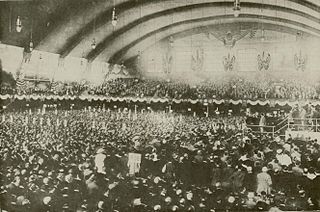
The 1912 Democratic National Convention was held at the Fifth Regiment Armory off North Howard Street in Baltimore from June 25 to July 2, 1912.

In 1896, William Jennings Bryan ran unsuccessfully for president of the United States. Bryan, a former Democratic congressman from Nebraska, gained his party's presidential nomination in July of that year after electrifying the Democratic National Convention with his Cross of Gold speech. He was defeated in the general election by the Republican candidate, former Ohio governor William McKinley.

The 1896 United States elections elected the 55th United States Congress. Republicans won control of the presidency and maintained control of both houses of Congress. The election marked the end of the Third Party System and the start of the Fourth Party System, as Republicans would generally dominate politics until the 1930 elections. Political scientists such as V.O. Key, Jr. argue that this election was a realigning election, while James Reichley argues against this idea on the basis that the Republican victory in this election merely continued the party's post-Civil War dominance. The election took place in the aftermath of the Panic of 1893, and featured a fierce debate between advocates of bimetallism and supporters of the gold standard.

In 1896, William McKinley was elected President of the United States. McKinley, a Republican and former Governor of Ohio, defeated the joint Democratic and Populist nominee, William Jennings Bryan, as well as minor-party candidates. McKinley's decisive victory in what is sometimes seen as a realigning election ended a period of close presidential contests, and ushered in an era of dominance for the Republican Party.

The 1896 United States presidential election in Idaho took place on November 3, 1896. All contemporary 45 states were part of the 1896 United States presidential election. State voters chose three electors to the Electoral College, which selected the president and vice president.
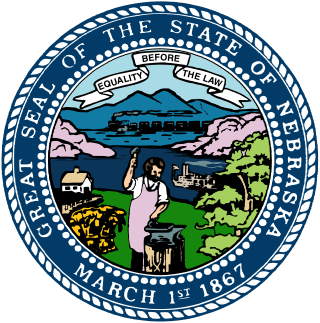
The 1896 United States presidential election in Nebraska took place on November 3, 1896. All contemporary 45 states were part of the 1896 United States presidential election. Voters chose eight electors to the Electoral College, which selected the president and vice president.

The 1896 United States presidential election in Washington took place on November 3, 1896. All contemporary 45 states were part of the 1896 United States presidential election. State voters chose four electors to the Electoral College, which selected the president and vice president.

The 1896 United States presidential election in Missouri took place on November 3, 1896. All contemporary 45 states were part of the 1896 United States presidential election. Voters in Missouri chose 17 electors to the Electoral College, which selected the president and vice president.

The 1896 United States presidential election in Kentucky took place on November 3, 1896. All contemporary 45 states were part of the 1896 United States presidential election. Voters chose 13 electors to the Electoral College, which selected the president and vice president.
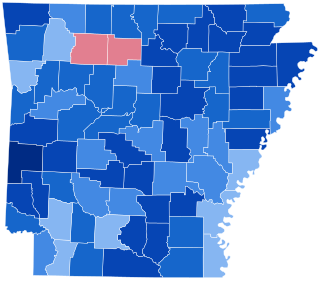
The 1896 United States presidential election in Arkansas took place on November 3, 1896. All contemporary 45 states were part of the 1896 United States presidential election. Voters chose eight electors to the Electoral College, which selected the president and vice president.

















































